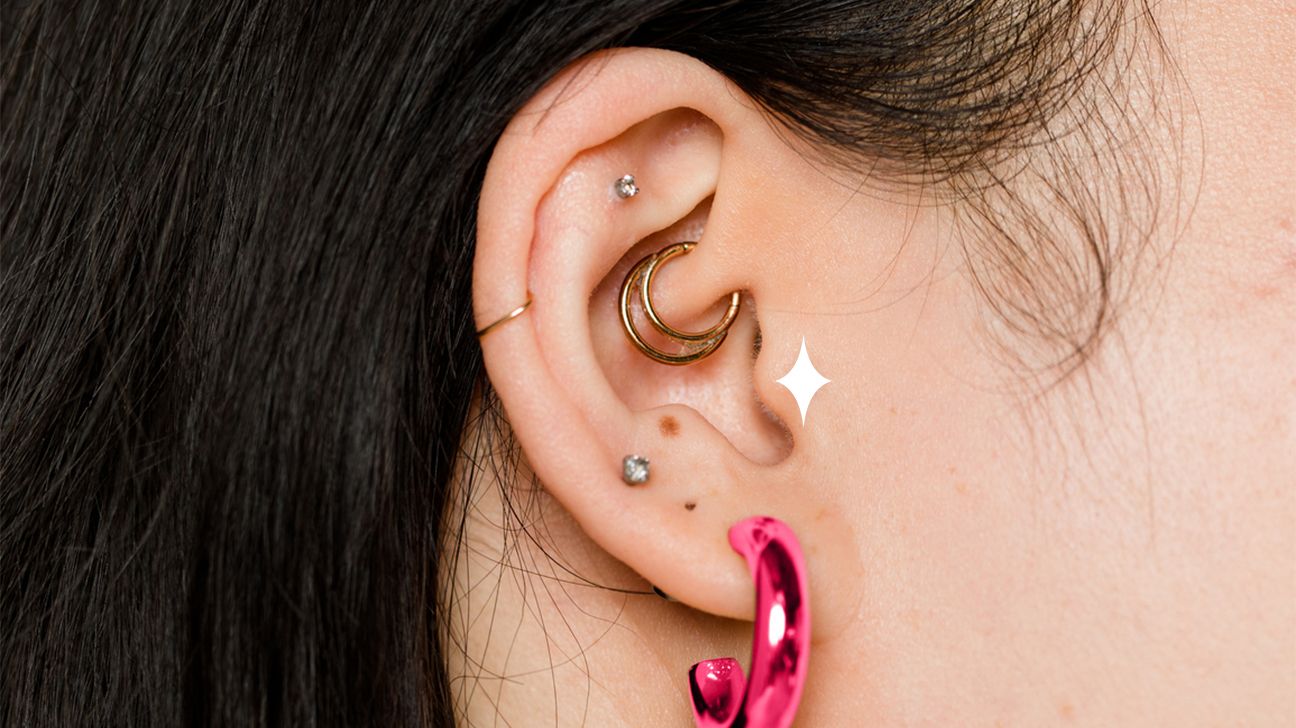Migraine attacks are the WORST. Not only do they cause intense pain, they can prevent you from living your best life. Could a tragus piercing help remedy the piercing pain of migraine? Here’s what the science says, plus other great alternatives.

According to the American Migraine Foundation, up to 80 percent of folks who live with headache and migraine disorders have tried alternative treatments. One of these methods is the tragus piercing. Here’s why it might work.
The tragus piercing may help stimulate the vagus nerve, the longest of the 12 cranial nerves. It carries tons of info from your brain to your organs and vice versa.
According to the American Headache Society, vagus nerve stimulation (VNS) may help with chronic headache conditions like migraine and cluster headaches. VNS may also help treat chronic inflammation disorders like:
- sepsis
- diabetes
- lung injury
- rheumatoid arthritis (RA)
Tragus piercings seem promising because of results that have been achieved using acupuncture. Studies show that when acupuncture’s performed in the same area as the tragus piercing, it helped relieve migraine and tension headaches.
One 2016 Cochrane review analyzed 22 different trials that included a total of almost 5,000 participants. The researchers found that acupuncture helped reduce migraine frequency more than no treatment at all.
Reminder: While piercings and acupuncture both involve needles, they’re not the same thing. We need more studies to prove tragus piercings specifically can provide relief.
There’s no science to back the idea that piercing one ear will provide better results than the other ear. But most folks get it done on the side of their head that’s most affected by migraine. You could also opt to have both sides pierced, but it’s still possible that it might not make a difference.
Tragus piercings are generally super safe if they’re done correctly. But there are still some things you should keep in mind before trying this method.
- Healing takes time. Tragus piercings take longer than earlobe piercings to heal. It can take 6 months to a year to fully bounce back, but discomfort should chill out in a couple of weeks.
- Go to a professional. You should never DIY a piercing at home. (Trust us.) You also need to follow your pro’s aftercare instructions to reduce your risk of infection.
- It’s not for everyone. Folks who have diabetes, hemophilia, or any health condition that prevents the body from healing should avoid piercings.
- Be careful which metal you use. You should figure out if you have a skin sensitivity before you pull the tragus trigger. Nickel is the most common metal allergy, but some folks are also allergic to other kinds like copper, stainless steel, and silver.
- Call your doctor if there’s an issue. Let your doc know ASAP if you have infection symptoms like pus, itching, burning, swelling, or throbbing.
Want to know more about tragus piercing aftercare? Check out this great guide.
Tragus piercings aren’t the only migraine remedy around. Here are some great, proven treatments to help you feel better.
- Prescription medications. Lots of meds can help you symptoms. Popular options include ergotamines, triptans, beta-blockers, and antidepressants. The type of medication you get will depend on the cause.
- Relaxation techniques. Studies show meditation can help improve sleep quality and make you more resilient to stress. That’s not just good for your general health, it’s also helpful for your head. Poor sleep and high stress are common migraine triggers.
- Stay hydrated. About one-third of peeps who have migraine claim that dehydration is a trigger, according to the American Migraine Foundation. They suggest drinking 2 liters a day to stave off symptoms. You may also want to avoid drinks that can dehydrate you like alcohol and caffeine.
- Magnesium. Some research suggests folks who have a magnesium deficiency are more likely to have migraine than those who don’t. A small 2008 study found that 600 mg of oral magnesium citrate a day reduced the severity and frequency of participant’s migraine attacks. PSA: You should always talk with your doc before switching up your supplement regimen.
Some anecdotal evidence supports the idea that tragus piercings can reduce migraine symptoms. But there’s not enough science to show it’s 10/10 going to help. But it might be worth a shot! Just be sure you go to a legit piercing place and keep your piercing clean to reduce your risk of infection.
